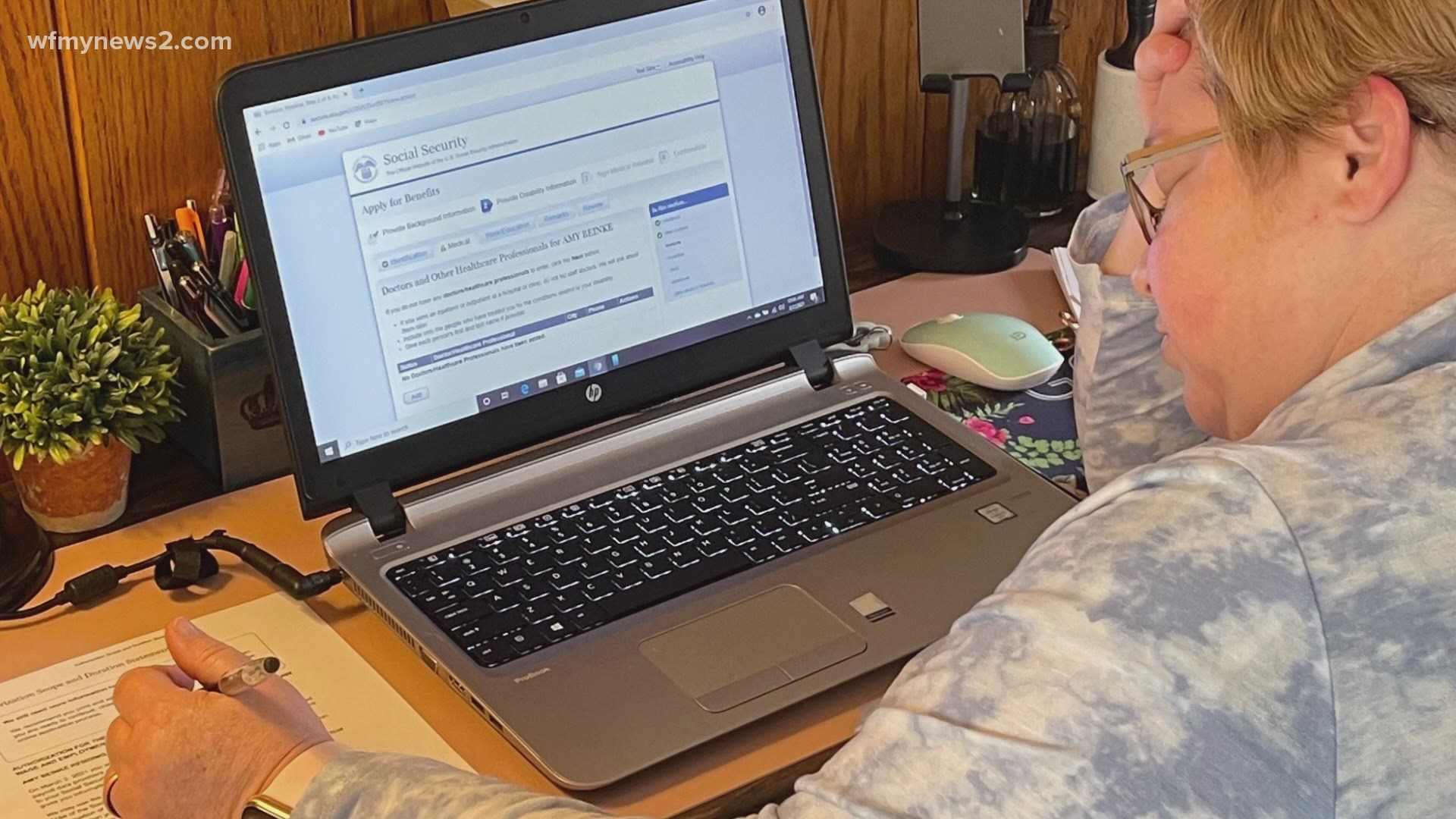GREENSBORO, N.C. — Amy Beinke had the best of both worlds, a well-paying job that she absolutely loved.
“It’s been my life for more than 20 years,” Beinke said.
As a registered nurse, Beinke worked in hospitals and emergency rooms before transitioning to Healthcare Manager at an in-home nursing company.
“Most of my day is spent in front of a computer or on the phone, but I still go out in the field on occasions,” Beinke said.
The past year has certainly changed in-home healthcare quite a bit. Beinke was well aware of the added risks involved with the job as it relates to COVID-19. What she didn’t expect was to fall victim to it.
“I contracted COVID from my daughter who was on Spring break and then had to move home when her university shut down,” Beinke said.
At first, the effects of the virus seemed minor. Beinke only missed a few days from work, and while she dealt with extreme fatigue, she was able to battle through it.
“I would work a normal day and then come home and go straight to bed,” Beinke said.
This went on for several months until one day in September, the virus caught up to her.
“It was really bad. My coworkers thought I was having a stroke,” Beinke said.
She was rushed to the hospital and spent several days in ICU. Doctors ran multiple tests and lab work. While she was not dealing with any respiratory issues, the other problems were serious. A neurologist was brought in to help diagnose the symptoms.
“My neurologist was not able to assure me or give me any indication as to how long my recovery will take,” Beinke said.
It has been almost five months and Beinke is still not able to work. She deals with severe fatigue, migraines, vision issues, and loss of memory. There are days when she struggles to do much of anything.
“I would say, I am probably 40-percent of what I was before COVID,” Beinke said.
Now considered a “long-hauler” by medical professionals, Beinke has been dealing with the effects of COVID-19 much longer than most. What might surprise you, is that one in 10 people who have contracted COVID-19 will experience long-term symptoms, but not necessarily as bad as Beinke’s.
“That is what is scary, because we don’t know if this is going to be permanent or something that is going to be resolved as we move on,” Dr. Olu Jegede of Cone Health said.
Dr. Jegede is not Beinke’s doctor, but as a medical director at Cone Health, he’s seen hundreds of cases like this. While every patient is different, many will suffer from COVID-19 for many months and eventually get better, while others are still dealing with symptoms.
“The one that is really disturbing to patients mostly is difficulty thinking, or having their concentration maintained,” Dr. Jegede said.
If life for Beinke has not been difficult enough, she recently filed for short-term disability with her employer. After filling out the paperwork and submitting all the forms and doctors’ reports that were required, Beinke was told she was not covered.
“I felt like I worked hard, I paid for this benefit and when I needed it, it was not there for me,” Beinke said.
With her medical bills piling up and out of work for about three months at that point, Beinke started to worry. How was she going to pay the bills?
“It was terrible. I had about $12,000 in out-of-pocket bills,” Beinke said.
Not sure what to do, Beinke reached out to us at News 2. We contacted her employer at the insurance company. This case took some time and several phone calls. A supervisor with the company told us they would investigate the issue.
After a couple of weeks, we were sent an email explaining the decision. While the company could not provide specific information related to the claim, it did resolve the issue.
We are aware of our employee’s concern, but due to privacy policies, are unable to comment on any specific individual health matters. Our short-term disability plan includes coverage for COVID-19 cases. We have worked with our benefits vendor to reach a quick resolution.
Our top priority is ensuring the health and safety of our hardworking employees as well as the patients and clients they serve. We continue to work diligently to ensure our staff has the proper personal protective equipment (PPE), training, and other resources to reduce the risk of contracting and spreading COVID-19 while at work.
Beinke has since started to file for long-term disability as it appears her recovery will take much longer than she had hoped. The money she received from her short-term claim was finally received early this year.
“If you had not gotten involved, my short-term disability claim was going to be closed out,” Beinke said. “It means I can keep my house; it means I can keep my car.”
The road to recovery for Beinke and many people still suffering from COVID-19 is unknown. Research and studies are being conducted every day to try and better understand why COVID-19 affects some in ways others never experience.
Cone Health has recently opened a clinic to help people still suffering from COVID-19 symptoms several months after contracting the virus. The goal is to help treat patients in a more controlled environment.

